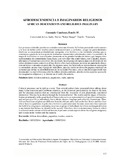| dc.rights.license | http://creativecommons.org/licenses/by-nc-sa/3.0/ve/ | |
| dc.contributor.author | Coronado C., Emeliv D. | |
| dc.date.accessioned | 2017-04-18T17:53:06Z | |
| dc.date.available | 2017-04-18T17:53:06Z | |
| dc.date.issued | 2017-01 | |
| dc.identifier.issn | 1690-3226 | |
| dc.identifier.uri | http://www.saber.ula.ve/handle/123456789/43325 | |
| dc.description.abstract | Los procesos culturales pueden ser contados como una historia. Así lo han presentado varios autores a la hora de hablar sobre muchos países latinoamericanos y caribeños, ya que las particularidades históricas se encuentran profundamente arraigadas a los hechos y a las realidades alternas que se
construyen a partir de la evocación de fenómenos inmateriales considerados reales. La realidad y la magia de lo histórico se ven reflejadas claramente en las grandes hazañas de héroes, que fungen como representantes de comunidades específicas, y no solo dan vida a individuos, sino a ideales, deseos,
añoranzas y frustraciones colectivas. De este modo, las religiones afroamericanas son diferentes de los cultos afroamericanos, como lo es el San Benito o San Juan en los que no existe un panteón de dioses, sino un fervor a un santo en particular. En algunos casos, los fieles solo se representan en una región
o comunidad, en una clase o grupo de individuos, para los cuales tal devoción pagana constituye un elemento que define su identidad dentro de la sociedad. Por tanto, esta es una investigación de tipo documental, la cual reflexiona sobre la cultura afrodescendiente, aborda ciertos aspectos acerca de los imaginarios religiosos y se detiene en el vudú y la santería. | es_VE |
| dc.language.iso | es | es_VE |
| dc.rights | info:eu-repo/semantics/openAccess | |
| dc.subject | Afrodescendencia | es_VE |
| dc.subject | Paganismo | es_VE |
| dc.subject | Vudú | es_VE |
| dc.subject | Santería | es_VE |
| dc.title | Afrodescendencia e imaginarios religiosos | es_VE |
| dc.title.alternative | African descendents and religious imaginary | es_VE |
| dc.type | info:eu-repo/semantics/article | |
| dc.description.abstract1 | Cultural processes can be told as a story. Thus several authors have presented when talking about many Latin American and Caribbean countries, as the historical particularities lie deep to the facts
and the alternate realities that are constructed from the evocation of real phenomena considered immaterial. This has been shown through the historical novel. The reality and the magic of historic,
feature prominently in the great deeds of heroes who serve as representatives of specific communities, and not just give life to individuals, but to ideals, desires, longings and collective frustrations. Thus,
African American religions are different from the African cults, such as the San Benito and San Juan where there is a pantheon of gods, but a fervor to a particular saint. In some cases only they represent the faithful in a region or community, in a class or group of individuals for whom such pagan devotion
is an element that defines its identity in the society. Therefore, this is a documentary research, which is reflected on the culture of African descent, it presents certain aspects about the religious imaginary
and it stops in the voodoo and the santeria. | es_VE |
| dc.description.colacion | 113-120 | es_VE |
| dc.description.email | emelivcoronado@hotmail.com | es_VE |
| dc.description.frecuencia | Semestral | |
| dc.identifier.depositolegal | pp200202TR1298 | |
| dc.publisher.pais | Venezuela | es_VE |
| dc.subject.facultad | Núcleo Rafael Rangel (NURR) | es_VE |
| dc.subject.institucion | Universidad de Los Andes | es_VE |
| dc.subject.keywords | African descendents | es_VE |
| dc.subject.keywords | Paganism | es_VE |
| dc.subject.keywords | Voodoo | es_VE |
| dc.subject.keywords | Santeria | es_VE |
| dc.subject.publicacionelectronica | Academia | |
| dc.subject.seccion | Academia: Ensayos | es_VE |
| dc.subject.thematiccategory | Artes y Humanidades | es_VE |
| dc.subject.tipo | Revistas | es_VE |
| dc.type.media | Texto | es_VE |


